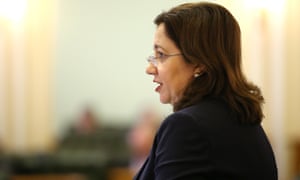Large political donations from unions and action groups will be restricted and individual donors also limited
Queensland
will impose Australian-first election campaign spending limits and laws
to block large political donations among a suite of integrity reforms
announced on Tuesday.
The proposals would entitle candidates and political parties to receive almost double the amount of “per vote” public funding, with a lowered threshold to be eligible. Although controversial, many integrity experts argue tipping the balance towards taxpayer-funded elections increases transparency and reduces the influence of large donors.
“People are wanting a government brave enough to do what needs to be done in this space, and take money out of politics,” the premier, Annastacia Palaszczuk, said.
The laws were criticised by the state’s Liberal National party opposition who said that rather than increasing transparency, they would favour Labor by allowing the union movement to run expensive third-party campaigns.
Under the proposals, candidates would be limited to spending $57,000 if endorsed by a political party or $87,000 if independent. Political parties would be limited to a total election spend of $92,000 a seat, an effective limit of $8.5m for the total campaign.
The laws would restrict third-party organisations, including unions,
political action groups like GetUp and industry bodies, to spend $87,000
in a single electorate, with an overall cap of $1m.The proposals would entitle candidates and political parties to receive almost double the amount of “per vote” public funding, with a lowered threshold to be eligible. Although controversial, many integrity experts argue tipping the balance towards taxpayer-funded elections increases transparency and reduces the influence of large donors.
“People are wanting a government brave enough to do what needs to be done in this space, and take money out of politics,” the premier, Annastacia Palaszczuk, said.
The laws were criticised by the state’s Liberal National party opposition who said that rather than increasing transparency, they would favour Labor by allowing the union movement to run expensive third-party campaigns.
Under the proposals, candidates would be limited to spending $57,000 if endorsed by a political party or $87,000 if independent. Political parties would be limited to a total election spend of $92,000 a seat, an effective limit of $8.5m for the total campaign.
Individual donors would be limited to spending $10,000 an electoral cycle, which Palaszczuk said was a bid to crack down on the cash-for-access culture of expensive political fundraising lunches.
“The days of the $10,000- and $5,000-a-head conferences are gone,” she said.
The government would increase payments to candidates from $1.57 a vote to $3 a vote, with the eligibility threshold lowered from 6% of the first-preference vote to 4%.
Payments to political parties would increase from $3.14 to $6 a vote.
“We will also increase public funding to clean up our system once and for all, Palaszczuk said. “And for the cost of a cup of coffee for every Queenslander, we can once and for all have a fair and democratic electoral system in Queensland.”
The Greens welcomed the reforms but said Labor must go further and introduce other integrity measures, including rules to prevent MPs from taking lobbying jobs when they retire from politics. The party also wants a ban on donations from the mining and gambling sectors. Queensland already has laws restricting donations from property developers.
“Corporate donations make life harder for everyday Queenslanders because it lets banks, lobbyists and mining companies set the agenda,” Greens MP Michael Berkman said.
“There are still big questions for Labor to answer, including whether they are leaving union affiliation fees unrestricted as in Victoria, and whether they are cracking down on ‘dark money’ donations from associated entities.”
Donation limits were introduced by the Bligh government in Queensland but scrapped by the Liberal National party under Campbell Newman.
The LNP said the laws would enable the state’s 26 trade unions to each run third-party campaigns, spending up to $1m, which would allow Labor an unfair spending advantage.
“These new laws are all about the Labor party rigging elections,” the deputy LNP leader, Tim Mander, said.
“These laws are about nobbling the LNP and benefiting the Labor party. It obviously doesn’t [create a level playing field]. The Labor party only passes laws like this if it benefits the Labor party. It’s corrupt, it stinks and it’s anti-democratic.”

No comments:
Post a Comment